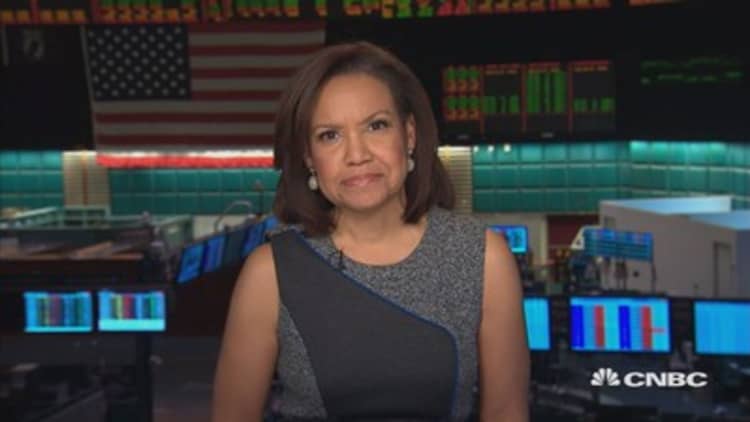Wall Street is expecting to see improvement in quarterly earnings as oil majors begin reporting this week after many of the world's biggest energy companies missed forecasts in the second quarter.
The last round was indeed a dramatic one. Exxon Mobil fell far short of forecasts due to weakening refining operations, while its smaller peer Chevron surprised investors with a loss of $1.5 billion as it booked $2.8 billion in impairments. Royal Dutch Shell whiffed on earnings forecasts to the tune of about $1 billion. BP reported a $2.25 billion net loss as costs related to the Deepwater Horizon oil spill continued to bite.
The majors are not off to a good start this earnings season. Norway's Statoil, the first among the energy behemoths up to bat, on Thursday reported adjusted operating profit fell nearly 70 percent from the same time last year to $636 million, missing estimates by more than $300 million.
For the rest of the space, analysts are expecting earnings to decline on the order of 30 to 85 percent from the year-earlier period. That said, many majors saw results improve from the first quarter of the year in the last reporting period, and analysts are anticipating another sequential improvement in the third quarter after a continued rebound in crude prices.
Shareholder payouts are also holding strong. This week, ExxonMobil announced an unchanged dividend of 75 cents per share, while Chevron increased its dividend by a penny to $1.08.
Oil futures jumped 26 percent in the second quarter and gyrated in a range between $40 and $50 in the third, ending the period roughly flat at $48 a barrel. But the stabilizing prices present a double-edged sword for integrated oil companies — the giant firms that drill for oil and natural gas, refine crude into fuels, and sell petroleum products to consumers.
They are at something of an inflection point in the current business cycle. Rising oil prices have begun to bolster their upstream drilling segments, but have squeezed profit margins in their refining operations.
Tightening the belt
That marks a shift from the first part of the two-year oil price downturn, when the refining business buoyed underwater upstream segments. As such, companies that have pivoted to embrace cost-cutting stand to reap the highest benefits.
"Companies are accepting the new competitive paradigm and that the value propositions and business models by which they planned to attain them have become uncompetitive," Evercore ISI wrote in a research note.
Evercore singled out Shell and French major Total for pledging to keep capital spending limited through 2020 even if the recovery continues. Shell and Total, along with U.S.-headquartered majors Exxon Mobil and Chevron, "will benefit from higher oil prices, lower costs and higher capital discipline near-term."
Piper Jaffray's Simmons & Co. International is similarly bullish on BP's expense-cutting as it brings a number of new projects online ahead of schedule and under budget.
"We have been impressed by BP's near obsessive focus on driving and retaining material cost reductions and efficiency gains," the firm said in a note.
The OPEC effect
While cost-cutting remains top of mind among big oil analysts, commodity watchers have lately been singularly focused on OPEC's efforts to enforce its first output limits when it meets in Vienna on Nov. 30. Speculation over the deal has sent both international benchmark and U.S. West Texas Intermediate futures to new 2016 highs this month.
Some majors stand to benefit from an OPEC accord more than others. Cowen and Co. said it favors Chevron and Shell for their exposure to rising oil prices, dividend yields and growth prospects.
The firm expects Chevron to swing from the largest funding deficit among its peers to the largest surplus as oil prices rise, in part on the strength of its holdings in Texas and New Mexico's low-cost Permian Basin, one of the only areas where U.S. drillers are adding rigs.
Cowen acknowledged shares of Shell have been relatively volatile due to its high capital spending and growing debt load, but said it stands to reap a significant cash flow windfall so long as a series of major projects reach start-up.
The firm sees Exxon Mobil lagging peers should OPEC agree to cap output, but Cowen still likes the company for its capital spending and the likelihood it will pick up assets through mergers or acquisitions before the end of the current business cycle.

The S&P 500 energy sector is the best performer this year, up nearly 15 percent. But Evercore believes there is still significant upside for big oil companies, as shares remain depressed relative to historical prices.
Six of the biggest oil companies — Chevron, Exxon Mobil, Royal Dutch Shell, ConocoPhillips, BP and Total — collectively shed more than $200 billion in market capitalization last year, according to CNBC analysis of FactSet data.
"We maintain that energy shares are in the 'sweet spot' of the investment cycle near term with oil prices rising, costs declining, and sentiment and valuation at abnormally low levels," Evercore said.


